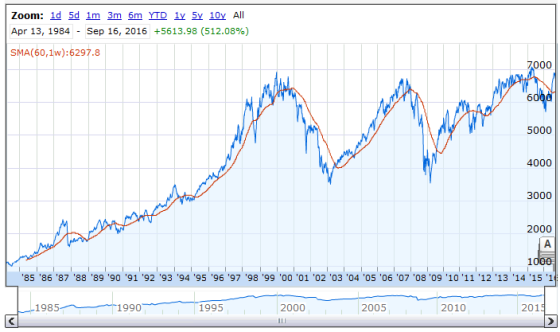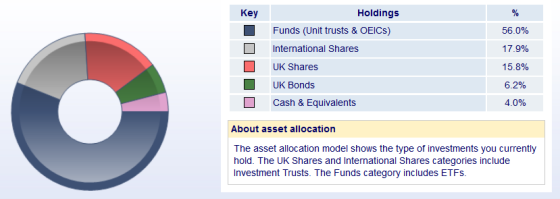Soooo.. I’m a bit of a fan of financial management and planning. I know…I’m a veritable babe magnet. I basically enjoy financial decisions, or to put it in stock-market terms ‘gambling’. To this end, and partly because I used to work in the city on and around city trading floors (in IT), I’ve always dabbled on the stock market a bit.
Like most investors I am an absolute mess of jelly-like emotional irrationality. Unlike many I’m aware of it, and try to manage it. I *TRY* to sell losers early and let winners ride. believe me it is HARD, but I am getting better. In the last few years I’ve actually analyzed my performance more than usual, with proper spreadsheets and so-on. its amazing BTW how hard share trading sites make it to work out if you have LOST money overall, or what your annualized ROI is. Obviously a lot of people lose money and they don’t want their customers to notice.
I have an ISA and a dealing account, and also positech invests too. When I look at my snazzy spreadsheet it tells me that my annualized return (ie: calculate every day I have had with each penny in the account, get a total of day*pennies, then divide by 365 days, and look at the gain/loss) is…. *drumroll*
8.88%
Thats for my company account. My personal account does better at 9.88%. My other account is definitely lower, maybe even a loss, but it involved transfers of really old investments and I don’t have accurate data for it.
So is 8.88% pretty good? This is starting on 1st December 2014, so lets look at the relative performance of the FTSE and NASDAQ since then
FTSE: 0.451% (climbed from 6656 to 6710 over 656 days)
NASDAQ 6.1% (climbed from 4725 to 5244)
So whoohoo! I am the next warren buffet etc. Maybe…probably not. Firstly, thats far too short a time span. if we look at ten years the FTSE has grown 1.4% a year (still shit, but better than my short sample). At 20 years its actually less (0.76%). Clearly a simple FTSE tracker is fraught with issues, just check the chart:

So how am I beating it?
Well I’m picking a mix of funds, corporate bonds, individual shares and ETFs. My big winners (really big) so far are Tesla, Facebook & the robotics ETF (ROBG). These have done well. Also my funds, specifically Global Equity and Asian Income have done well. I also do ok with a Bangladesh pharma company (Beximo) , Intel, and national grid bonds. Obviously I have had disasters too. ITV was one, A Ukrainian iron mine was another, Devro (sausage casings) another, and I’m badly down on Go-Ahead group.
I probably check my shares once a day, trade maybe once a week to ten days. A rough breakdown of investment types within my shares:

So how does this compare with other potential investments? because I love spreading the risk, I have invested over the years in some other stuff. Publishing games, Peer-to-peer lending, renewable energy and simple flat-rate bank accounts and term-deposits. Here is my geeky analysis.
| investment |
ROI |
Risk |
| Cash Deposits |
0.25% |
Almost Zero |
| Fixed Term Deposits |
2.0% |
Almost Zero |
| Share dealing |
8.88% |
High |
| Renewable energy (20 year term) |
7.70% |
Low |
| Peer-to-peer individuals |
4.9% |
Medium |
| Peer-to-peer companies |
6.7% |
Medium |
Obviously there are other considerations. I can’t lock away my savings for 25 years, what if my games do badly and I need money next year? P2P and Renewable energy stuff locks me in long-term. the Fixed term deposits are shorter but not so good. Theoretically all my shares are immediately liquid, but maybe not at an ideal price. However, given an 8.88% return I’m prepared to accept that. Something that is immediately clear is that cash is for suckers. Business savings accounts are a complete joke.
Although I sometimes come across a bit Jordan belfont, I’m not really, meaning that a lot of my ‘business’ and ‘investment’ decisions are actually moral and personal ones. There was NO business case for Democracy 3:Africa (A game that broke even this week, meaning so far I have earned almost nothing, and will hopefully make 10% ROI on it in the long run). My motivation for P2P lending is partly to undercut the bastard banks and payday lenders. My motivation for renewable energy should be obvious. My share dealing is all either ethical funds or shares picked by me. No weapons, no tobacco, no oil companies or airlines.
But anyway…to bring it back to gaming, how does all this compare with investing all the money in games instead? I’m a publisher too right?
ROI on Democracy 3: 1,215% assuming no salary for me.
ROI on Democracy 3:Electioneering: 21.24% assuming no salary for me. -64% if assumed decent salary.
ROI on GSB2: 64% assuming no salary for me. Equiv income of $24/hour.
ROI on Democracy 3: Africa: 1.24%
So yeah…Kinda variable. Note that these are the stats I have to hand. Redshirt & Gratuitous Tank Battles did not set the world on fire, but made decent money, but the ROI is not really up there.
Putting it all together: Games *can* be a good investment, or a great way to set fire to a pile of cash. *it depends*. Looking outside gaming, either learn to stock and fund-pick carefully, or invest in a wind farm.